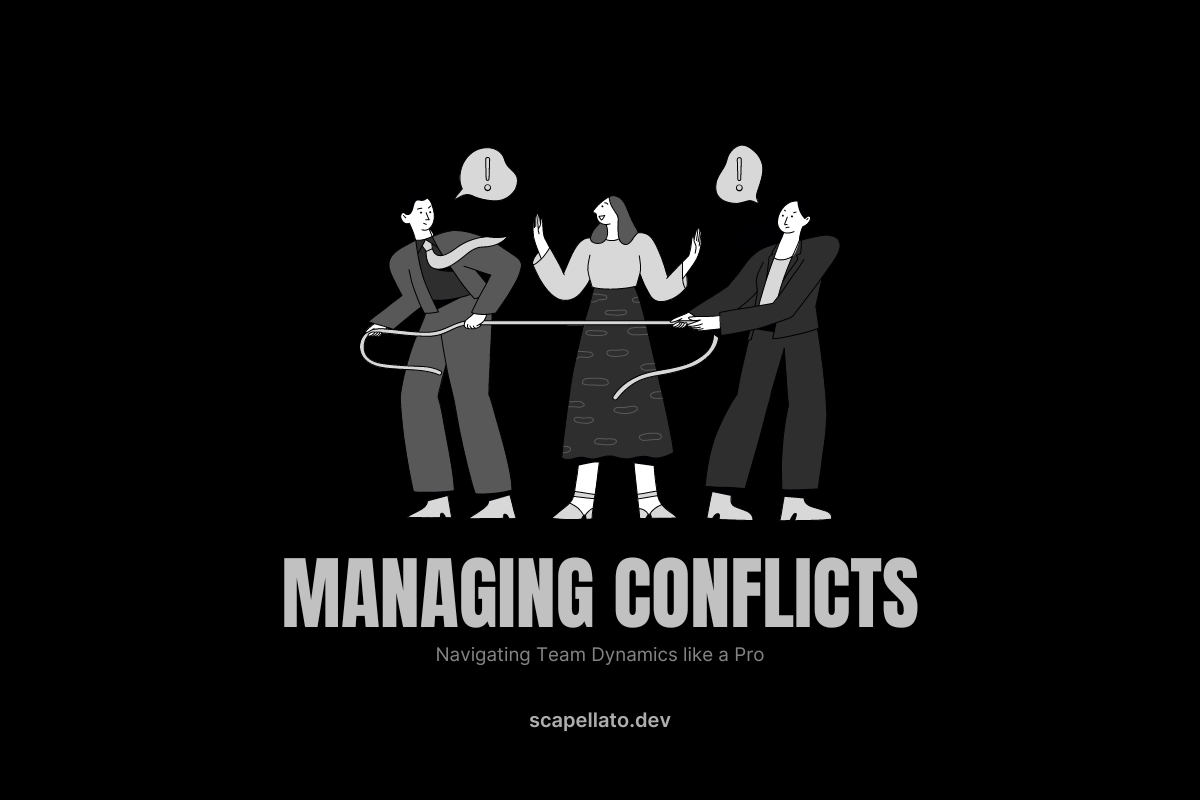How to Manage Conflict Within Your Tech Team: Strategies for Resolution
Navigating Team Dynamics like a Pro
Antonio Scapellato
Mar 10, 2024 • 10 min read

As a startup founder and former tech lead, I've navigated the turbulent waters of team dynamics and conflict resolution within engineering teams more times than I can count. In the fast-paced world of technology, where deadlines loom large and pressure is ever-present, conflicts are bound to arise. However, how you manage and resolve these conflicts can make all the difference between a team that thrives and one that falters.
Here are some strategies I've found effective in managing conflict within engineering teams:
1. Foster Open Communication:
One of the most effective ways to prevent conflicts from escalating is to encourage open and transparent communication within your team. Create an environment where team members feel comfortable expressing their concerns and opinions without fear of judgment. Regular team meetings, one-on-one check-ins, and anonymous suggestion boxes can all facilitate this open dialogue.
2. Address Issues Early:
Don't let conflicts fester. As soon as you become aware of a potential issue within your team, address it head-on. Ignoring conflicts or hoping they'll resolve themselves only allows them to escalate and potentially damage team morale and productivity. Schedule a meeting with the parties involved to discuss the issue openly and constructively.
3. Practice Active Listening:
Conflict resolution begins with understanding. When team members are in conflict, it's essential to listen actively to each side's perspective without judgment. Encourage each party to express their thoughts and feelings fully, and strive to understand the underlying concerns driving the conflict. Paraphrasing and summarizing what you've heard can demonstrate that you're actively listening and promote clarity.
4. Encourage Collaboration:
In many cases, conflicts arise from differences in opinion or approach. Encourage your team members to collaborate and find common ground whenever possible. Emphasize the shared goals and objectives that unite the team and encourage brainstorming solutions that accommodate different viewpoints. Sometimes, the best solutions arise from the synthesis of diverse perspectives.
5. Set Clear Expectations:
Ambiguity breeds conflict. Ensure that your team members have a clear understanding of their roles, responsibilities, and expectations. Establishing clear guidelines and processes for decision-making, task allocation, and conflict resolution can help prevent misunderstandings and reduce the likelihood of conflicts arising.
6. Mediate Effectively:
As a leader, it's your responsibility to facilitate resolution when conflicts arise. Act as a mediator, impartially guiding the discussion and helping the parties involved find common ground. Remain neutral, focus on the issues at hand, and encourage respectful communication. Sometimes, bringing in an external mediator can provide a fresh perspective and facilitate resolution.
7. Learn from Conflicts:
Conflicts, when managed effectively, can be valuable learning experiences for your team. Encourage reflection and constructive feedback after conflicts have been resolved. What can we learn from this experience? How can we improve our communication and collaboration in the future? Use conflicts as opportunities for growth and continuous improvement within your team.
8. Celebrate Successes:
Finally, don't forget to celebrate when conflicts are successfully resolved. Acknowledge the efforts of your team members in addressing and overcoming challenges constructively. By celebrating successes, you reinforce the importance of teamwork, communication, and conflict resolution within your engineering team.
In conclusion, conflict within engineering teams is inevitable, but it doesn't have to be detrimental. By fostering open communication, addressing issues early, practicing active listening, encouraging collaboration, setting clear expectations, mediating effectively, learning from conflicts, and celebrating successes, you can effectively manage and resolve conflicts within your team, ultimately strengthening team dynamics and driving success.
Remember, conflict is not always a sign of dysfunction; it's often a natural byproduct of passionate individuals striving for excellence. Embrace conflict as an opportunity for growth and transformation within your engineering team.